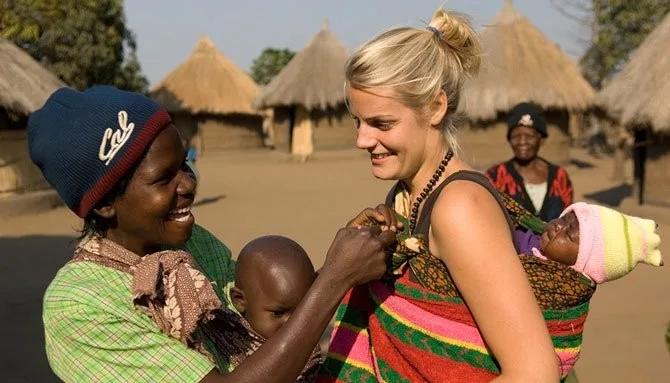Top 10 Most Peaceful Tribes in Nigeria (2024)
Nigeria is a country full of diversity, with over 250 different ethnic groups and tribes. Each tribe has its own unique culture, language, and customs. While there have been conflicts between tribes in the past, many Nigerian tribes are known for being peaceful people.
In 2024, Nigeria continues to face challenges, but there are tribes across the country that live in harmony within their communities. These tribes use practices like consensus-building and self-governance to maintain order and preserve their traditions.
This article will look at the top 10 most peaceful tribes in Nigeria today. Though they come from different regions and backgrounds, these tribes all value unity, tolerance, and living in peace with their neighbors.

TOP 10 MOST PEACEFUL TRIBES IN NIGERIA
Here is a look at the top 10 most peaceful tribes in Nigeria today.
EFIK TRIBE
The Efik ethnic group is widely seen as the most peaceful tribe in Nigeria.
The Efik people are an ethnic group located primarily in Cross River State in southeastern Nigeria. With a population of over 2 million, the Efik have a long tradition of living in tightly-knit communities where fishing, farming, and trading are the main economic activities.
The Efik tend to avoid conflict and have a collaborative decision-making process that engenders mutual agreement. Their egalitarian society is known for valuing peace, diplomacy and consensus-building.
The Efik continue to live peacefully in large, close-knit family units where they speak their native Efik language and follow their traditional religious beliefs and practices.
YORUBA TRIBE
There is no doubt that Yoruba seems to be the most welcoming and accepting tribe in Nigeria. They accept people from all over the country to live with them peacefully.
The Yoruba of southwest Nigeria have a population exceeding 40 million. Yoruba society has historically been defined by its city-states, each organized around chieftaincy systems that rule through sanctified authority and consensus. The councils of chiefs promote solidarity and harmony within the city-state and with their neighbors.
The predominantly Christian and Muslim Yoruba integrate their traditional beliefs into their faith practices peacefully.
Living in densely populated urban areas, the Yoruba have mastered community organization based on tolerance and accommodation. Their ancient kingdoms continue to promote unity and peace.
The most peaceful places in the Yoruba tribe is Osun, Ekiti and other states.
JUKUN TRIBE
Third on our list is the Jukun tribe based in the northern and central parts of Nigeria.
The Jukun population of over 3 million are renowned for their hospitality, cultural richness and peaceful way of life. Skilled farmers and traders, the Jukun continue age-old traditions of community life bound by respect for elders and shared values.
Jukun society is organized into chiefdoms headed by a king who inherits his position.
The Jukun have a history of accommodating travelers and welcoming visitors into their communities, where they live peaceably according to well-established customs and traditions.
IBIBIO TRIBE
Located in Akwa Ibom State in southeastern Nigeria, the Ibibio people are one of the largest ethnic groups in the country with a population exceeding 5 million.
Traditionally, the Ibibio have lived in autonomous, self-governing villages and towns that come together through shared economic, social and political ties.
The Ibibio practice consensus-based decision-making, have strong democratic inclinations, and a great appreciation for agreement and unity over conflict. Living in harmony is integral to Ibibio culture and society.
The Ibibio continue to thrive through farming, fishing, craftwork and trade while steadfastly maintaining their unique language, food, music, dance and religious customs.
IGBO TRIBE
The Igbo people number over 40 million found in southeastern Nigeria.
The Igbo traditionally lived in independent, democratic communities run by councils of elders and age grades. Social order was maintained through consensus and negotiation, with leadership granted based on merit rather than inheritance.
The Igbo continue to use a consensus-oriented approach for local governance and decision-making. They have a strong business tradition and are some of the most successful traders in Nigeria.
The Igbo prize their peaceful communities where vibrant culture, arts and religious diversity thrive together harmoniously.
EKOI TRIBE
The Ekoi people inhabit Cross River State near the Cameroon border in southeastern Nigeria.
With a population of around 500,000, they live in small, decentralized villages in the rainforests and grasslands of their homeland.
The Ekoi seek consensus through their Village Council and by taking community concerns to their clan elders. They have a cultural emphasis on group solidarity over individual interests.
The Ekoi are mainly subsistence farmers who supplement their livelihood through hunting and gathering. Living in balance with nature is central to their way of life.
The Ekoi continue to retain their unique cultural identity while coexisting peacefully in the region.
EBIRA TRIBE
The Ebira are an ethnic group of over 2 million people, based in Kogi State in central Nigeria. They have a reputation for being peaceful, hospitable and very accommodating to outsiders.
The Ebira practice a unique form of cultural democracy marked by community participation, inclusiveness and consensus decision-making. They live in large family units and foster a strong sense of community identity.
Most Ebira make their living through farming, trading and small-scale crafts. Their society is organized around clan groups and local chiefs who rule by consent and counsel. This system continues to promote amity throughout the region.
IGALA TRIBE
Also from Kogi State, the Igala people number over 5 million strong.
Igala society is centered around the venerable Attah Igala kingdom which dates back hundreds of years and promotes unity, stability and harmony in the region.
The Igala have inclusive, democratic practices locally that feed into the regional unity. They engage in consensus-based approaches to maintaining order and balance in their society. The Igala are an industrious agricultural and trading people.
Devout Christians and Muslims, they live their faiths in peace and equanimity in their communities.
TIV TRIBE
The Tiv people occupy the Benue, Nasarawa and Taraba states in central Nigeria where they number over 7 million strong.
The largely agricultural Tiv manage their affairs based on an egalitarian political system that puts a premium on consensus and popular participation. They are an acephalous ethnic group without centralized authority.
The Tiv pride themselves on tolerance, accommodation of religious diversity and a commitment to non-violence and coexistence with their neighbors.
NUPE TRIBE
Last but not the least on our list of the top ten most peaceful tribes in Nigeria is the Nupe ethnic group.
Based in Niger State, the Nupe has a population of around 2 million. They have a peaceful cohabitation irrespective of tribe, religion and politics. Conversion to Islam and Christianity was peacefully incorporated to coexist with traditional Nupe religious customs that promote harmony. This balance continues to define Nupe culture making them one of the most peaceful tribes in Nigeria.
CONCLUSION
In conclusion, Nigeria is home to many diverse yet peaceful tribes.
The tribes discussed here have rich traditions of social harmony, conflict resolution, tolerance, and community unity. Their continued embrace of non-violence sets a positive example for Nigeria.
Appreciating these peaceful tribes can help bring the nation together.
ALSO READ MORE ON TRIBES
- Top 10 Most Populated Tribes in Nigeria (2024)
- Top 10 Most Dangerous Tribes in Nigeria (2024)
- 10 Best Tribes to Marry As Wife in Nigeria (2024)
- Top 10 Worst Tribes to Marry From in Nigeria (2024)
- Differences Between Hausa and Fulani Tribes in Nigeria
- Top 5 Most Dirtiest Tribes in Nigeria (2024)
- Top 10 Most Promiscuous Tribes in Nigeria (2024)
- Top 10 Most Educated Tribes in Nigeria (2024)
- The Most Wicked Tribes in Nigeria: Full List
- Top 10 Poorest Tribes in Nigeria (2024)
- Top 10 Oldest Tribes in Nigeria
- Top 10 Tribes With the Cheapest Bride Price in Nigeria
- List of Nigerian Tribes With The Strongest Juju
- Top 5 Most Corrupt Tribes in Nigeria (2024)
- Top 10 Most Peaceful Tribes in Nigeria (2024)
- Top 5 Most Friendly Tribes in Nigeria
- The Most Neatest Tribes in Nigeria Today (2024)

